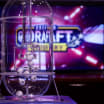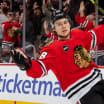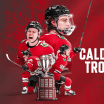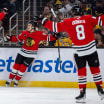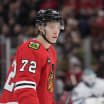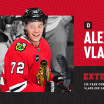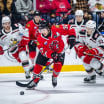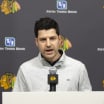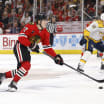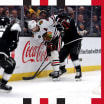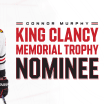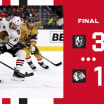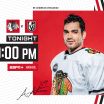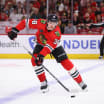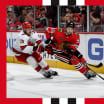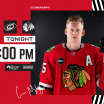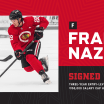This just in. Patrick Sharp also knew.
For years, some of us have obeyed the urban legend that only two players were aware, in real time, of the clinching goal when the Blackhawks won the 2010 Stanley Cup: Patrick Kane, who shot it, and Michael Leighton, who missed it.
Verdict: Sharp a key part of the perfect Blackhawks storm
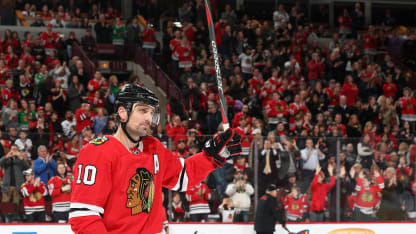
© Chase Agnello-Dean/Getty Images
By
Bob Verdi
Blackhawks.com
But now, for sure, there emerges a third eye-witness to the 4-3 overtime winner in Game 6 of the Final against the Philadelphia Flyers at the Wachovia Center.
"From where I was on the ice, I saw the puck make a bulge in the back of the net," recalled Sharp, who forced a turnover but did not receive an assist on the play. "Kaner started celebrating and I tried to catch him right off the jump. But Andrew Ladd, my other winger on that line, kind of set a pick.
"It was a great night for all of us, but really special for me. The Flyers drafted me, and I had played there a bit with them. When I lifted the Cup, I looked up and saw the banner from the Philadelphia Phantoms, their American League farm team. Calder Cup champions 2005. Played on that team too."
Sharp recently retired with a thick scrapbook of such highlights: three Stanley Cups over six seasons in Chicago, 42 career playoff goals (good for sixth all-time on the Blackhawks' list), lasting friendships as a leader, mentor and unofficial ambassador for his team and his sport, plus an Olympic gold medal with Team Canada in 2014.
Fittingly, Sharp's full circle ended in Winnipeg, where he was born 36 years ago. He thought his last game would be just another game until the Jets had a better idea.
"Another video tribute, 24 hours after I was still getting over the one in the United Center," Sharp went on. "I was pretty sure 'Chevy' had something to do with that. Kevin Cheveldayoff, their general manager, was a big part of building our team in Chicago before he went to Winnipeg. I saw him after the game, said thanks and gave him a hug. I've been so lucky, so fortunate."
The Blackhawks feel the same way. Searching for talent, not to mention an identity, they dealt for Sharp in December 2005. Then-General Manager Dale Tallon and staff liked the kid's wheels, and his nose for the net. Mark that down among the most lopsided trades in Chicago sports history.
"I had struggled to play minutes with the Flyers," Sharp said. "I thought I had what it took to make it in the National Hockey League, and in 2004, they had a lockout for the entire season. So I played the whole year with the Phantoms, and it was a blessing in a way. I got a lot of ice time, against a lot of good players. Some of them, I had seen when we played the Norfolk Admirals, Chicago's farm team at the time. I saw guys making the jump to the NHL from the AHL. I improved my game and thought I could too."
Sharp's arrival in Chicago prompted no parades (those would come later.) He's frequently regaled us with tales about how he and Duncan Keith visited train stations bearing free tickets to the United Center. They wore Blackhawks uniforms and barely were accorded even golf claps from disinterested commuters. What is this, a costume party? Halloween?
"Then there was another promotion, which I thought was a pretty good idea," Sharp said. "All of us got business cards with our names and instructions how to get tickets. You know, you'd go out to dinner and maybe leave your business card with the waiter. Choose a home game. Please. Don't remember that going over real big, either.
"There weren't a lot of people in the United Center back then, but looking back, I became part of a perfect storm. Duncs and Brent Seabrook were there. Then came Kaner and Jonathan Toews. The outdoor game at Wrigley Field. We were a young group getting better with a great new organization under John McDonough and Rocky [Wirtz]. Then the sellout crowds every night, so many games in a cool atmosphere, then three Cups. So many good times, but I knew this season would be my last."
Carter Hutton and Robert Bortuzzo, a couple of St. Louis Blues also from Thunder Bay, Ontario, hugged Sharp after his farewell tour around the United Center rink ¬- an arrangement by Keith, who made sure Sharp could not depart. Now that he has, Patrick doesn't know quite what the next chapter will mean. He'd like to be involved in hockey somehow. Broadcasting is a possibility, but family comes first. Whatever happens, the Blackhawks, who admire Sharp so fondly, will miss him. Also, they can breathe easier when their backs are turned. A serial prankster has hung up his skates and his manual for mischief.
"Me?" said Sharp. "Well, maybe. I know that when Kane and Toews started as rookies, we gave them a hard time. It never really stopped. But don't forget Adam Burish and Dustin Byfuglien. They were pretty relentless."
Nobody was safe. There was a road trip to Denver. Hall of Fame broadcaster Pat Foley planned dinner with a friend. Ten minutes after he arrived at the hotel and returned to the lobby, Foley intoned, "My room has just been rearranged. Sharpy."
<>
"I can neither confirm nor deny that I was involved in that," said Sharp. "But I do know that there are two busses after we land. One for players, another for staff. And the team bus can beat the staff bus to the hotel. There are two tables of envelopes with room keys. One for team and one for staff. And I have heard that in each envelope, there are usually two room keys. But I can neither confirm nor…"
But isn't turnabout fair play?
"Burish and I are hanging out on the road one night," Sharp said. "We're watching TV. Finally, it's time to go to bed. Our beds are made up perfectly, just like you would find them. Except when we peel back the covers, our sheets are soaking wet. Drenched. Marian Hossa. Payback."
It's over for Sharp, but it wasn't over until it was over.
"That last game in Winnipeg?" he said. "Our trainers told me Byfuglien was trying to get into our locker room before the game, probably to mess with my equipment. But they intercepted him. Like I told you, don't be giving a pass to Byfuglien in all this."

